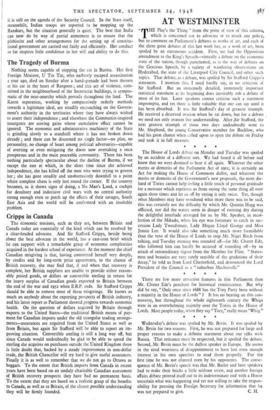The Tragedy of Burma
Nothing seems capable of stopping the rot in Burma. Her first Foreign Minister, U Tin Tut, who narrowly escaped assassination a year ago, died on Sunday after a hand-grenade had been thrown at his car in the heart of Rangoon ; and this act of violence, com- mitted in the neighbourhood of the Secretariat buildings, is sympto- matic of the near-anarchy which prevails throughout the land. The Karen separatists, working by comparatively orderly methods towards a legitimate ideal, are steadily encroaching on the Govern- ment's authority in the territories where they have always wished to assert their independence ; and elsewhere the Communist-inspired insurgents are scoring gains whose cumulative effect cannot be ignored. The economic and administrative machinery of the State is grinding slowly to a standstill where it has not broken down already ; and there can be discerned no single factor—no plan, no personality, no change of heart among political adversaries—capable of averting or even mitigating the doom now overtaking a once prosperous and in the main peaceable community. There has been nothing particularly spectacular about the decline of Burma, if we except the rate at which, in the short time since she achieved independence, she has killed off the men who were trying to govern her ; she has gone steadily and unobstrusively downhill to a point where complete chaos is only just round the corner. If the country becomes, as it shows signs of doing, a No Man's Land, a cockpit for desultory and indecisive civil wars with no central authority strong enough even to patch up the effects of their ravages, South East Asia and the world will be confronted with an insoluble problem.


































 Previous page
Previous page